Top Rankings
Jennings School District ranks among the top 20% of public school district in Missouri for:
Category
Attribute
Community Size
Largest student body (number of students) (Top 1%)
For the 2025 school year, there is 1 public middle school serving 345 students in Jennings School District. This district's average middle testing ranking is 1/10, which is in the bottom 50% of public middle schools in Missouri.
Public Middle School in Jennings School District have an average math proficiency score of 15% (versus the Missouri public middle school average of 38%), and reading proficiency score of 18% (versus the 40% statewide average).
Minority enrollment is 99% of the student body (majority Black), which is more than the Missouri public middle school average of 31% (majority Black).
Overview
This School District
This State (MO)
# Schools
7 Schools
830 Schools
# Students
2,331 Students
233,376 Students
# Teachers
120 Teachers
20,291 Teachers
Student : Teacher Ratio
19:1
19:1
District Rank
Jennings School District, which is ranked within the bottom 50% of all 553 school districts in Missouri (based off of combined math and reading proficiency testing data) for the 2021-2022 school year.
The school district's graduation rate of 85-89% has stayed relatively flat over five school years.
Overall District Rank
#534 out of 557 school districts
(Bottom 50%)
(Bottom 50%)
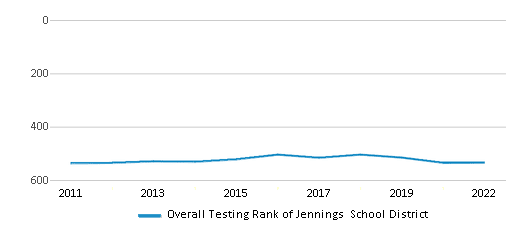
Math Test Scores (% Proficient)
14%
39%
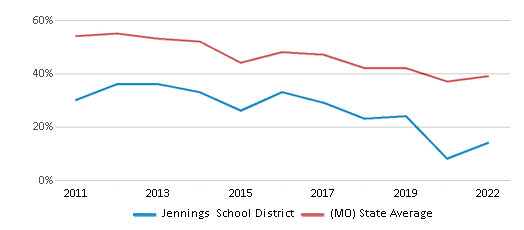
Reading/Language Arts Test Scores (% Proficient)
19%
43%
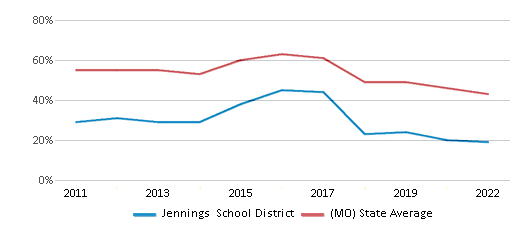
Science Test Scores (% Proficient)
17%
38%
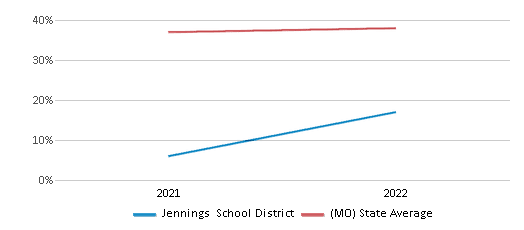
Graduation Rate
85-89%
90%
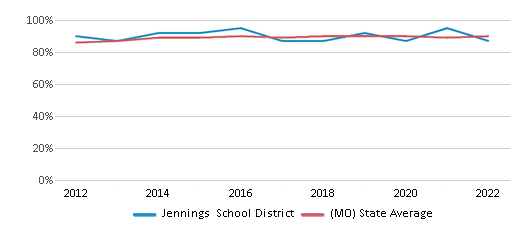
Students by Ethnicity:
Diversity Score
0.06
0.49
# American Indian Students
n/a
895 Students
% American Indian Students
n/a
1%
# Asian Students
n/a
4,582 Students
% Asian Students
n/a
2%
# Hispanic Students
24 Students
18,531 Students
% Hispanic Students
1%
8%
# Black Students
2,260 Students
35,869 Students
% Black Students
97%
15%
# White Students
12 Students
161,241 Students
% White Students
1%
69%
# Hawaiian Students
n/a
840 Students
% Hawaiian Students
n/a
n/a
# Two or more races Students
35 Students
11,418 Students
% of Two or more races Students
1%
5%
Students by Grade:
# Students in PK Grade:
143
2,573
# Students in K Grade:
165
2,732
# Students in 1st Grade:
174
2,984
# Students in 2nd Grade:
200
2,965
# Students in 3rd Grade:
181
3,038
# Students in 4th Grade:
168
3,162
# Students in 5th Grade:
167
6,674
# Students in 6th Grade:
149
47,831
# Students in 7th Grade:
174
65,734
# Students in 8th Grade:
171
66,934
# Students in 9th Grade:
243
7,517
# Students in 10th Grade:
179
7,274
# Students in 11th Grade:
113
7,118
# Students in 12th Grade:
104
6,840
# Ungraded Students:
-
-
District Revenue and Spending
The revenue/student of $12,029 in this school district is less than the state median of $15,081. The school district revenue/student has stayed relatively flat over four school years.
The school district's spending/student of $11,835 is less than the state median of $13,908. The school district spending/student has stayed relatively flat over four school years.
Total Revenue
$28 MM
$13,447 MM
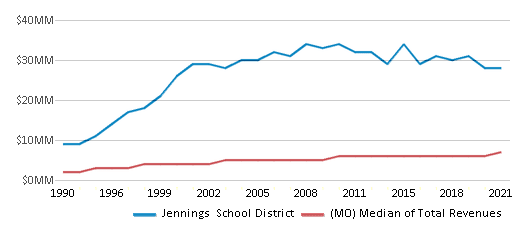
Spending
$28 MM
$12,401 MM
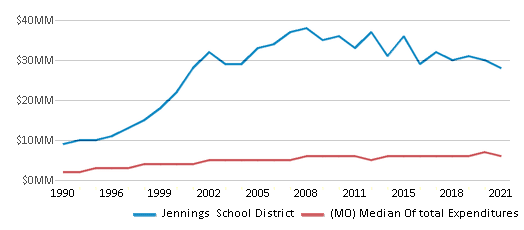
Revenue / Student
$12,029
$15,081
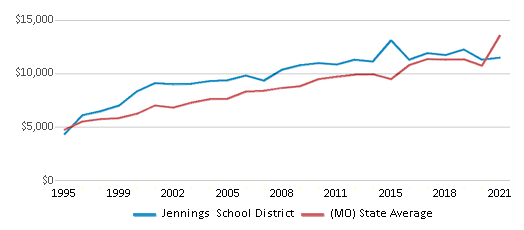
Spending / Student
$11,835
$13,908
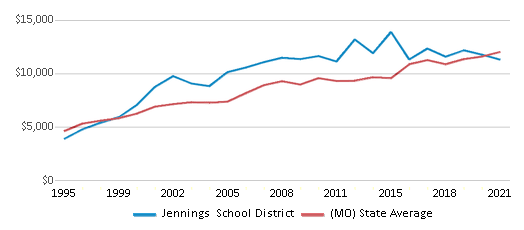
Best Jennings School District Public Middle Schools (2025)
School
(Math and Reading Proficiency)
(Math and Reading Proficiency)
Location
Grades
Students
Rank: #11.
Rose Johnson Jennings Jr. High School
(Math: 15% | Reading: 18%)
Rank:
Rank:
1/
Bottom 50%10
8831 Cozens
Saint Louis, MO 63136
(314) 653-8150
Saint Louis, MO 63136
(314) 653-8150
Grades: 6-8
| 345 students
Recent Articles

What Is A Charter School?
Explore the world of charter schools in this comprehensive guide. Learn about their history, how they operate, and the pros and cons of this educational innovation. Discover key facts about charter schools, including admission policies, demographics, and funding, as well as what to look for when considering a charter school for your child.

10 Reasons Why High School Sports Benefit Students
Discover the 10 compelling reasons why high school sports are beneficial for students. This comprehensive article explores how athletics enhance academic performance, foster personal growth, and develop crucial life skills. From improved fitness and time management to leadership development and community representation, learn why participating in high school sports can be a game-changer for students' overall success and well-being.

February 05, 2025
Understanding the U.S. Department of Education: Structure, Impact, and EvolutionWe explore how the Department of Education shapes American education, from its cabinet-level leadership to its impact on millions of students, written for general audiences seeking clarity on this vital institution.





